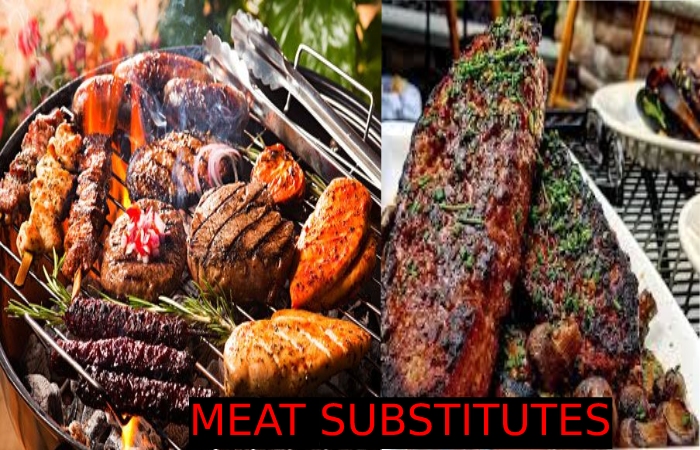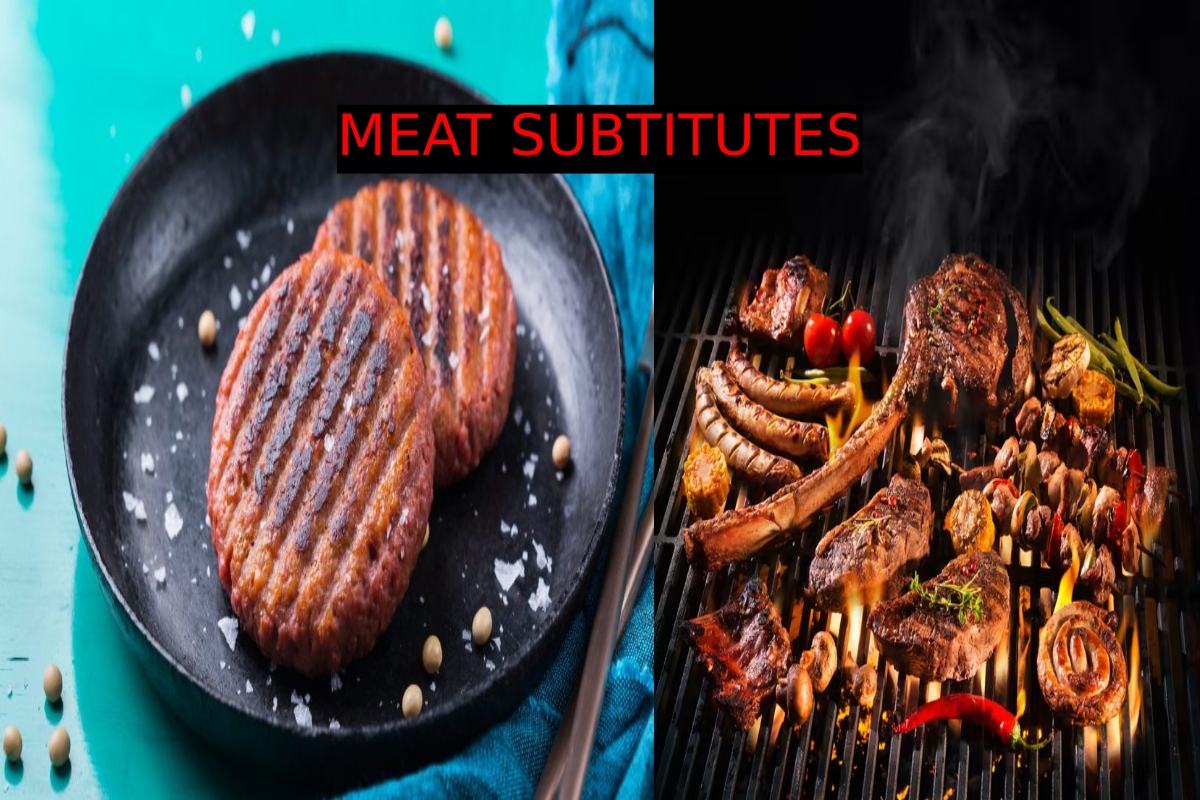Table of Contents
About Meat Substitutes
Meat Substitutes – Meat products on the market today are different in one important way: An alternative meat, like a Beyond Meat burger or the Impossible Burger.
It is a product made from plants that taste like meat, be marketed to meat-eating customers, and replace some of those customers’ meat purchases. That’s what types them different from veggie burgers, typically aimed mainly at vegetarians.
Products are made from natural animal cells but are grown in a food production vegetable instead of taken from animals raised in captivity and crushed for ingesting. These aren’t on the market yet, except for a couple of restaurants in Singapore, and some are sceptical that they’ll work out.
But they are meat alternatives too, and they might be part of the big picture as we try to move away from relying on factories undeveloped to supplying the meat regulars want.
The leading companies that harvest meatless meat products have gone out of their way to ensure their products won’t be tarred just for vegetarians. For example, Burger King’s Impossible Whopper comes slathered in mayo — not vegan at all — and when I went to get an Impossible Burger at a San Francisco restaurant, nearly every selection paired it with bacon bits.
They Taste like Meat
Some of the leading meat substitutions on the market today are burgers, ground beef, and sausages from two companies: Impossible Foods and Beyond Meat.
“Both companies have led with taste,” Zak Weston, an analyst at the Good Food Institute, told me. Everyone agrees that taste will be a significant make-or-break factor for these companies. Does their meat taste like meat?
It means a Lot more about Meat Substitutes then meat Lately
Also, a more tangible thing has been keeping meatless meat in the headlines: fast-food companies’ widespread adoption of meatless meat products. Impossible Foods and Beyond Meat have both grabbed a lot of headlines in the last couple of years.
Impossible scored a company with Burger King to offer meatless Whoppers. Burger King joined White Castle, which sells Impossible Foods sliders, and Carl’s Jr. sells burgers from Impossible Foods’ competitor Beyond meat. Del Taco announced it’ll offer Beyond beef, too.
And in late 2020 and early 2021, Beyond Meat announced partnership deals with McDonald’s and Yum Brands, which owns KFC, Taco Bell, and Pizza Hut. And Qdoba announced that it would offer the Impossible Bowl and the Impossible Taco at all its US locations.
What happened, and how did it happen so fast? Specialists told me they see a virtuous cycle. Consumers — more concerned with health and sustainability than ever before — demand the products, which feeds publicity and fuels more customer demand.

Who studies meat replacements at UC Berkeley told me that numerous restaurants and food manufacturers had been waiting to see whether the approval of plant-based meat was a fad.
As consumer interest has grown, “companies have become more aware that this is here to stay” — and they’re placing their orders. That generates more publicity, makes more regulars interested in the products and convinces other businesses that the trend is real.
Meat Substitutes then meat Better for the Environment than Regular Meat
Yes — meatless meat can make a massive difference for the environment by practically every metric, including land use, water use, and aggressive weather change. Right now, however, it’s too small a share of the market to significantly impact those difficulties.
Meat Substitutes More Healthful than Meat
Plant-based foods consume the possibility to have a vastly tiny carbon footprint. Overall, you have to feed an animal ten calories of plants to get one calorie of meat, so you can expect plant-based foods to have about one-tenth the carbon costs of animal-based foods.
That’s a highly rough guideline, but it’s surprisingly close to the results you get from a much more careful calculation. An Impossible Burger 2.0 found that its carbon footprint is 89 per cent smaller than a burger made from a cow.
It also uses 87 per cent less water and 96 per cent less land. That’s a development from the 1.0, and Impossible Foods confidences it can slice the carbon footprint even more as it scales its processes.
So, there’s potential for meatless meat to type a massive difference in the environment. But the analysts I spoke to upstretched one central point of scepticism: rule.
Right now, the entire meatless meat commerce makes up less than 1 per cent of the product volume of the meat industry. Yes, it’s upward fast, and yes, it’s in the headlines, but nearly all meat sold in the US and worldwide is old-style meat.
As long as meatless meat remainders a niche industry, it simply can’t affect the climate because it’s too tiny to matter.
The Best Types of Meat Substitutes
A meat substitute or meat other is a food that may taste, feel, or appear similar to meat but does not contain meat.
Popular Meat Substitutes
The following are some foods and products that people use in place of meat, either for texture, flavour, or added nutrients.
Some vegetarian and vegan harvests may contain these meat alternatives and extra ingredients.
Tofu

Tofu is condensed soy milk that producers media into blocks of varying inflexibility, similar to how dairy milk becomes cheese.
He is a reasonable basis of protein and comprises all the essential amino acids a person needs for good health.
That is versatile and has a very mild flavour, so people can try marinating it to give it the taste they desire. Some people use it to substitute eggs or mix it into hot dishes such as soups and stir-fries.
Many companies produce and sell tofu so that the nutritional content may vary between products.
Typically, 1 cup of tofu Trusted Source contains –
- calories: 188.4
- Protein: 20 grams (g)
- Fat: 11.86 g
- Calcium: 868 milligrams (mg)
- Iron: 13.3 mg
- Fibre: 0.744 g
They may wish to look for a tofu product certified organic or listed as non-GM.
According to some 2016 explore, 82% of the world’s soybean farms have genetically modified organisms.
Tempeh
Tempeh is a traditional Indonesian soy-based meat substitute. It has a few critical alterations from tofu.
Creators make tempeh from the whole soybean, not soy milk, and they use a fermentation process. Tempeh has a drier surface, and some tempeh harvests contain a blend of extra beans or ounces.
Because it contains the entire bean, tempeh may also have more fibre and protein than tofu. It also contains gut-friendly prebiotics and probiotics due to the fermentation procedure.
One cup of Tempeh Trusted Source covers –
- calories: 319
- protein: 33.7 g
- overweight: 17.9 g
- calcium: 184 mg
- iron: 4.48 mg
- Tempeh is also a reasonable basis for magnesium and vitamin B-6.
Seitan
Seitan originates from wheat gluten. The production process eliminates the starch from the wheat, typically by rinsing it with water. This procedure leaves behind a protein-dense food with a texture like that of chicken and a mild sensitivity.
Seitan, or “vital wheat gluten,” is an element in several mock meat harvests.
Though it is nutritious, it is not safe for people with celiac disease, and it is not suitable for people who follow a gluten-free diet. Some seitan products cover other ingredients, such as legumes or seasonings.
A 4-ounce (oz) serving of seitan Trusted Source comprehends –
- calories: 140
- Protein: 28 g
- Fat: 2 g
Seitan is high in riboflavin, niacin, and vitamin B-6, but not calcium or iron.
Conclusion
Meat alternatives are widely obtainable and can be a healthful method to get protein and other nutrients without eating meat.
Many are appropriate for vegetarians and vegans, but they can also be an excellent choice for people who eat meat but are observing to cut down for health or environmental explanations.
The key to any healthful diet is to choose a diversity of nutrient-rich whole foods and be sure to include enough protein, fibre, vitamins, and minerals.
Also Read: Eyebrow Hair – Meaning, Causes, Treatment, And More
Related Searches:
best meat substitutes
soy-based meat substitutes
meat substitutes recipes
meat substitutes for protein
cheap vegan meat substitutes
best meat substitutes for protein
meat analogue
best plant-based meat substitutes

